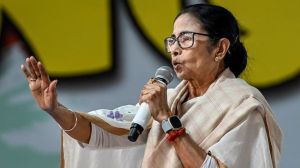The feel-bad factor
A Feel-Good factor today pervades the country, which has been infected by anenduring cynicism. India has changed and, perhaps, for the bet...

A Feel-Good factor today pervades the country, which has been infected by anenduring cynicism. India has changed and, perhaps, for the better. Among thesignificant evolutionary trends is the fact that we no longer care about thebrand of politics that is pursued as long as the objectives of goodcitizenry are met.
We are becoming an increasingly proud people. Proud of our global standing,of the successes we have had as far as insulation from the last year8217;s SouthAsian meltdown is concerned, of the fact that there are less riots today.We also seem to be moving towards becoming a just society. We see the richand famous being jailed for misdemeanours; we see the powerful failingbefore the law; and we also see a decline in corruption. We are not aboveboard in everything we do, but there is a trend towards greateraccountability. Our industrialists no longer clamour for protectionism; theyare adjusting to the travails of a free market where the consumer is kingand where the quality of the product and not the depth of influence willyield success.
Having said all this, one must also reflect on the ills that plague us: illsthat will dog every progressive step we take and will push us further fromthe development we so richly deserve.
We have completely neglected primary health. Here both the state and theprivate sector have abdicated their responsibilities. They have ensured thathealth remains a non-issue. Linked to this is our pathetic record on thepopulation front. I was appalled to see Sumitra Mahajan gift several hampersto our billionth baby; a day of collective shame was presented as one ofunbridled triumph. On the primary health front, we continue to pat ourselveson the back by declaring lower levels of infant mortality, failing torecognise the state8217;s duty to ensure the good health of its people.
The recent outbreak of cholera in a Delhi colony is symptomatic of the illsthat plague even our metros so you can well imagine what must be going on inour villages and towns. The trauma is evident in the eyes of our people whoare facing this travesty of reality in their lives day after day. Health asan issue has also been given the short shrift by our politicians, whose onlyconcern is their own health, both during and after power! So while the statedoes not bat an eyelid paying obscene sums of money to purify V P Singh8217;swater for his dialysis machine, there is complete neglect in setting upbasic primary health centres and, where these exist, in equipping them.
On the education front, our track record is even more abysmal. Here theNehruvian model has only worked partially. While we have created cases ofexcellence in the form of IITs and IIMs, we have ignored primary education,the bedrock of any developmental economy. Result: we create excellentcollege-level students but very poor careers.
We have infused the educational system with degrees rather than courses witha stress on vocational education. In a country with a surfeit of youngpeople, we are equipping our people not with basic skills but only withknowledge which in any case in these fast-paced times is dated. So what wehave is a large educated base which is unemployable.
Add government subsidies in higher education to this, and you have asituation in which you see your best students fleeing Indian shores topursue their own golden dream. A situation where our very definition ofliteracy is warped one which declares you literate as long as you can signyour name! and where we look only at the statistical achievements of statesbecoming literate rather than examining the virtues of this literacy andwhether it at all translates into real income and creation of wealth for ourpeople.
This brings me to another point: our bureaucracy has been so insensitive toreal development that we trivialise the problems which face us today. Haveyou ever heard of a bureaucrat being accountable? Politicians can loseelections if their constituents8217; taps run dry but the bureaucrat can bleedthe system and nothing will ever happen! One must also reflect on the rolemedia has begun to play in this context. Serious reportage has been replacedby the racy and the sensational. Marketing directors are today editors andvice versa with the result that this last vanguard of social consciousnessand accountability has itself become a victim of avarice and greed.
I believe that the Narayanamu-rthys and the Subash Chandras have builtenormous value in the made-in-India label so what if the Industry Ministerand the Commerce Minister can barely administer the India Brand Equity Fund?Strategist Kenichi Ohmae talked of a borderless world many years ago andspoke of a geo-political world which would recognise capabilities stemmingout of economic power and not military might: hence the moot question thatbegs to be answered is: what kind of brand is India today and how do we addvalue to this brand? There must be a general awakening in that we need tobecome more responsible in our march towards a civil society and this marchcannot comprise the 500 people who have unflinching faith in their influenceand the fixers that surround them.
The real progress must be as Gandhi envisaged: from the bottom. Which is whyit is a matter of greater pride that the drivers at Infosys are millionairesand not just the Narayanamurthys. Which is why it is sad that the RahulBajajs having bled the license raj still fight for a level-playing fieldand that every sensible disinvestment step has to be converted into a sopfirst, as in the case of the recent telecom bonanza by a populistphilanthropist!
There is no reason for us not to be proud but there are still reasons for usto be a wee bit wary and sometimes as-hamed. We should be ashamed of thebrand of religion-driven politics that we follow, of the kind of chasms wehave created between the haves and the have-nots, of tragedies like Uphaarand Gh-aisal, of being still found wanting in terms of both health and mind.True, Bill Clinton came calling and gave us a good certificate onwork-in-progress. True, Jaswant Singh in his undecipherable baritone stillcommands global acceptance. True, more Indians impact the global softwareor ICE stocks than any other race. But then it is also true that we cannotboast of good governance at all levels or of a just society or of a robustnation.
India continues to be a paradox, one which hesitantly embraces progress anddevelopment. Unsure of the might of its people and even unsure of the futureit must chart for them. We need to focus on this more than anything else.Our energies must be directed in delivering what we promise and not onextending the tenure of the promise alone. If we can do this, the millenniumwill, as it should, be India8217;s. If we don8217;t, then successive generations ofIndians wherever they may reside will never forgive us!
- 01
- 02
- 03
- 04
- 05































